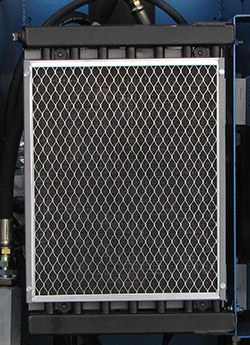
Manufacturier de presses hydrauliques

The most prevalent cause of system failure for hydraulic systems is the existence of leaks, and the second most prevalent cause of system failure for hydraulic systems is overheating. To effectively manage any mechanical deficiencies directly related to a specific malfunction requires a specific perspicacity of the particular dynamic involved. Understanding the dynamic involved with leaks is quite simple, making it easy to engage. However, overheating is somewhat more complex of a mechanical problem due to the fact that there are a number of factors that can lead to overheating. This makes investing the time necessary to understand the causes of overheating paramount to developing the ability to engage the issue in an efficacious manner.
Cause of Hydraulic Press Overheating
Any elevation in the hydraulic press fluid temperature is a direct result of some type of deficiency in the equipment. Ultimately, the existing deficiencies that are present will adversely impact the input power of the hydraulic machinery. Subsequently, the energy loss and the rise in temperature will be converted to heat. Overheating occurs when the rate at which escaping energy is converted to heat exceeds the rate at which the machine is capable of dissipated the heat. In simple, when the heat is rising at a rate that exceeds the machine's capacity to reduce heat, overheating will occur.
The first step in assessing an overheating issue is to evaluate the quality of the press in question. Quality press is vital to avoid mechanical issues down the road, and the most effective method for ensuring quality is to purchase the machinery from a reputable manufacture of hydraulic presses like Press Master.
Effectively Managing the Hydraulic Fluid Temperature
It is of vital importance to have a working knowledge of hydraulic fluid heat thresholds. When there is a failure in maintaining the appropriate fluid temperature, it will result in the poor functionality of the fluid, negatively impacting the operation of the machine. When the temperature of hydraulic fluid exceeds 180º F, the chance of damaging the seals increases exponentially. This can lead to multitudinous exacerbations, such as a reduction in the fluid viscosity, leading to fluid degradation.
If the fluid degradation issue is not corrected, the system will continue to decrease in performance capacity, which will perpetuate a cycle in which performance will suffer and overheating will increase. To further exacerbate the issue, the reduction in fluid viscosity will limit the fluids ability to guard against the heat generated by the friction between moving parts.
Keeping Hydraulic Fluid Temperature Stable
In simple, a system has to be functioning at an efficiency level that allows the hydraulic press to dissipate heat at a faster rate than it is being generated in order to avoid system overheating. For instance, if a hydraulic press has a constant input power of 100 kW, while performing at a constant rate of 80 percent, the heat offset capacity would have to be a minimum of 20 kW. What this means is that a system that is designed to offset a heat load of 25 kW would automatically overheat when the heat load exceeded 25 kW. Proper maintenance is the most efficacious method for ensuring that a hydraulic system does not overheat. By changing out the worn parts on a regular basis, as well as changing out worn hydraulic fluid, the press will maintain a high level of efficiency, reducing the chances of overheating.
Contact Press Master to get the best hydraulic press for your needs.